Farmcolony Bids Farewell to
Bill and Ann Bohn
With gratitude for their twenty-five years of hard work and service to our family farm!
On any given day you could spot Bill Bohn’s Kabota somewhere on the farm. It was easy to spot. Bill’s Kabota is the orange one with every tool imaginable hanging from its side panels. Whenever you saw it, you knew something was getting done on the farm.
Bill and Ann Bohn moved to Farmcolony in 1998 after selling their small farm in nearby Dyke. They quickly became key players in the management of the farm. Bill, a retired Army engineer who had also worked in facility maintenance at the University of Virginia, spent many hours a week maintaining fields, fences, and buildings, while Ann, retired from teaching at Nathanael Greene Elementary School, managed the Farmhouse.
“Bill was pretty much the de facto farm manager,” according to Bill’s best buddy and righthand man, Mike Friedman. Mike would call Bill every morning at 8:30 to find out what they would be working on that day. It could be fencing, trimming, bush hogging, repairing buildings, tuning up a tractor, even removing a boulder, whatever needed to be done that day.
According to historical documents, Farmcolony originally employed a farm manager. This practice ended early on when residents deemed it preferable to have a resident as farm manager who could be present at all hours if needed. Don Thurnau, one of the founding members of the farm, stepped into the role. According to a written history of Farmcolony by historian Deborah Lee for the Board of Directors in 2020, Farmcolony underwent a major shift in management and labor in the 1990s. Don Thurnau retired from daily farm work in 1993. For the first time since the establishment of Farmcolony, no one assumed the farm manager position. Members overwhelmingly chose to operate the farm themselves. As fortune would have it, in steps Bill and Ann.
“Bill was the major mover on getting the farm back up,” according to Dieter who moved to the farm with his wife, Irene, in 2006. Dieter was a U.S. Air Force veteran, serving 28 years in the U.S., Africa, Asia and Europe, and at the time still traveling for consulting work. “Most of it fell on Bill until I got myself worked into it,” according to Dieter. “Bill Dichtel, Ray Rush and Mike Friedman — and later Angel Cyphert — also helped with the cattle. In those days we only had about 16 cows and maybe six calves, and an old bull, Jimbo.”
“Bill was the manager of the fields,” Dieter adds, “and (together) we determined when we can and should hay, and the fertilization and the fencing.” According to Dieter, other members of the farm stepped in to help with the the bigger jobs, like haying or cattle roundups — Matt Hodges, Greg Prior, and Erich Nitzsche, to name a few. Also, Grant Sinclair was deeply involved in the never-ending task of mowing and such.
Above and Beyond the Call of Duty
Bill played a significant role in keeping our farm running smoothly over the past 25 years, and then some. He often went above and beyond the call of duty in assisting other members with their special projects on the farm.
In 2007 Rose Arbogast donated a gazebo as a memorial to her husband Roger Arbogast, a U. S. Navy veteran, musician and instrument maker. Bill Bohn and other volunteers installed the gazebo and built an attached deck by the orchard “where Roger used to sit and play bluegrass music, alone and with friends,” according to Deborah’s report. The gazebo continues to serve the community.
In 2013 the chicken committee, charged with breaking even financially, disagreed on whether to cull older, less productive hens or care for them until their natural end, according to the report. To resolve the issue, Bill built a mobile chicken coop for the older hens, meant also as an experiment to move around to fertilize the fields. Recently, the chicken mobile was refurbished to use in a new experiment with heritage breed chickens.
When several residents wanted to experiment with raising bees, it was Bill who found a suitable beehive location and sectioned off a part of a field with electric fencing to protect the newly established hives from bears.
According to the historical record, members faced the increasingly urgent need to update the farmhouse great room. In the words of Bill at the time, the great room “was falling apart around us.” An engineer was consulted “since the walls were seven or eight inches out of plumb and the room wider at the roof than the floor.” Lot owner Brad Lovelace was the contractor for the project, assisted by homeowner Greg Prior. Others did the electrical work and radiant heat was installed in the floor, “as that seemed the most efficient way of heating the space.” Bill led a volunteer force of Farmcolony residents who assisted the contractor in the renovation of the great room, which saved the farm untold dollars in labor costs.
When it came to managing the farmhouse, Bill and Ann worked as a team. Ann kept the house clean, managed the rentals, and alerted Bill if any maintenance problems crept up. Whenever a maintenance problem did creep up, Bill fixed it. A great team who provided a great service to the community!
Bill Makes Weed Control Fun
Labor is a continual challenge on the farm, but Bill knew how to rally the forces when extra help was needed. Simply put, he knew how to make work fun. When Bill noticed the spread of the dreaded Perilla weed growing profusely along the road to the burn pile, he rallied the community into action with a Perilla Pulling Party that turned the need to control a pernicious weed on the farm into a fun event.
A member of the mint family of plants, Perilla is known by many names — shiso, beefsteak plant, Chinese basil, rattlesnake weed, and purple mint. By any name it is a weed that can create respiratory problems in cattle, goats, horses and other ruminants that consume the plant while grazing. Originally from Asia, it is considered an invasive species in the U. S.
Farmcolony residents removed a massive amount of the Perilla growing along the road at the Perilla Pulling Party and had a blast doing it. Ann provided refreshments to the workers and Wildlife Secretary Deborah Lee provided Perilla tea, which is completely safe for human consumption, for those who were adventurous enough to try it. We have Ann and Bill to thank for this fun and educational event, and for showing us that we can get work done and have plenty of fun in the process.
“Nice Job, Bill Bohn!”
So exclaimed Farmcolony Board President Susan Dunahoo as Bill gave his final report to the board to conclude the Conservation Reserve Enhancement Program (CREP), a grant program that provided funding for upgrades on the farm to facilitate rotational grazing, and is a testament to Bill’s capable grant-writing skills.
Rotational grazing is the practice of moving grazing livestock between pastures (often called paddocks). Experts say rotational grazing has many advantages over the conventional practice of continuous grazing. Also, it distributes nutrients from manure more uniformly over the field which increases organic matter in the soil, nutrients that were once lost to the streams, the justification for grant funding through the Virginia Agricultural Best Management Practices Cost-Share Program, an initiative funded with state and federal monies to improve water quality in the state’s streams, rivers and the Chesapeake Bay.
Upgrades to the well and water distribution system, a key component of the CREP grant, were outsourced to contractors who were paid through the grant, but under Bill’s leadership farm residents provided much of the labor for fence installation and the farm was able to retain those funds allocated for labor costs which added $47,916.81 to our general budget, nearly 80% of what the farm typically made in a year.
Reserve Study
In 2020 the Farmcolony Board of Directors conducted an internal reserve study to comply with the Virginia Property Owners’ Association Act (POAA) that requires homeowners’ associations (HOA) to conduct a reserve study every 5 years, and update it annually. A reserve study is a budgeting tool that helps HOAs assess the physical and financial condition of a community to determine how much money to set aside each year in reserve accounts to cover long-term expenses.
To comply with the provisions of the POAA, the Farmcolony Board of Directors initiated the study to determine the amount of reserves needed to repair, replace, and restore the capital components. Bill Bohn led an on-site inspection and in-depth analysis of the physical assets of the farm that the association is responsible for maintaining and repairing, including an analysis of the cost of repair or replacement, no easy task. The examination covered six areas: Roads, culverts, farming Equipment, farmhouse, barns and outbuildings, and animal boarding facilities. Bill’s analysis underwent a professional review by the DMA Reserves firm in Richmond who conducted an on-site inspection and modified it to reflect their cost expectations.
Meeting this HOA reserve funding requirement can be difficult for many associations. Bill’s role not only helped lead the association through this difficult process, but saved the community thousands of dollars in costs for this service which was required of the association to meet our legal obligations.
Saying Goodbye
Those who have worked closely with Bill through the years echo similar sentiments. “Bill is a great guy!” “A damn good man!” “A man of intelligence and integrity.” “A positive man who worked hard and expected the same.” “Intelligent. Knowledgeable.”
“He is humble, hard-working, and incredibly knowledgeable. I am incredibly grateful for the time I got to spend working elbow to elbow with him. I learned so much.” “Bill will be most remembered for his work ethic and sense of humor.” “I will miss his sense of humor and mentorship.”
Bill’s deep understanding and knowledge of farm management guided the farm through many advances in farming techniques over the years. Ann, too, kept a stable hand on the running of the farmhouse on behalf of our members. Her soups for lunch at the farmhouse on workdays are legendary. A future without Bill and Ann on the farm is inconceivable for many of us, but one we’ll have to get used to as Bill and Ann make the move from Farmcolony to Lynchburg to live closer to their kids and grandkids. With them go our heartfelt gratitude for their twenty-five years of hard work and service to our family farm.
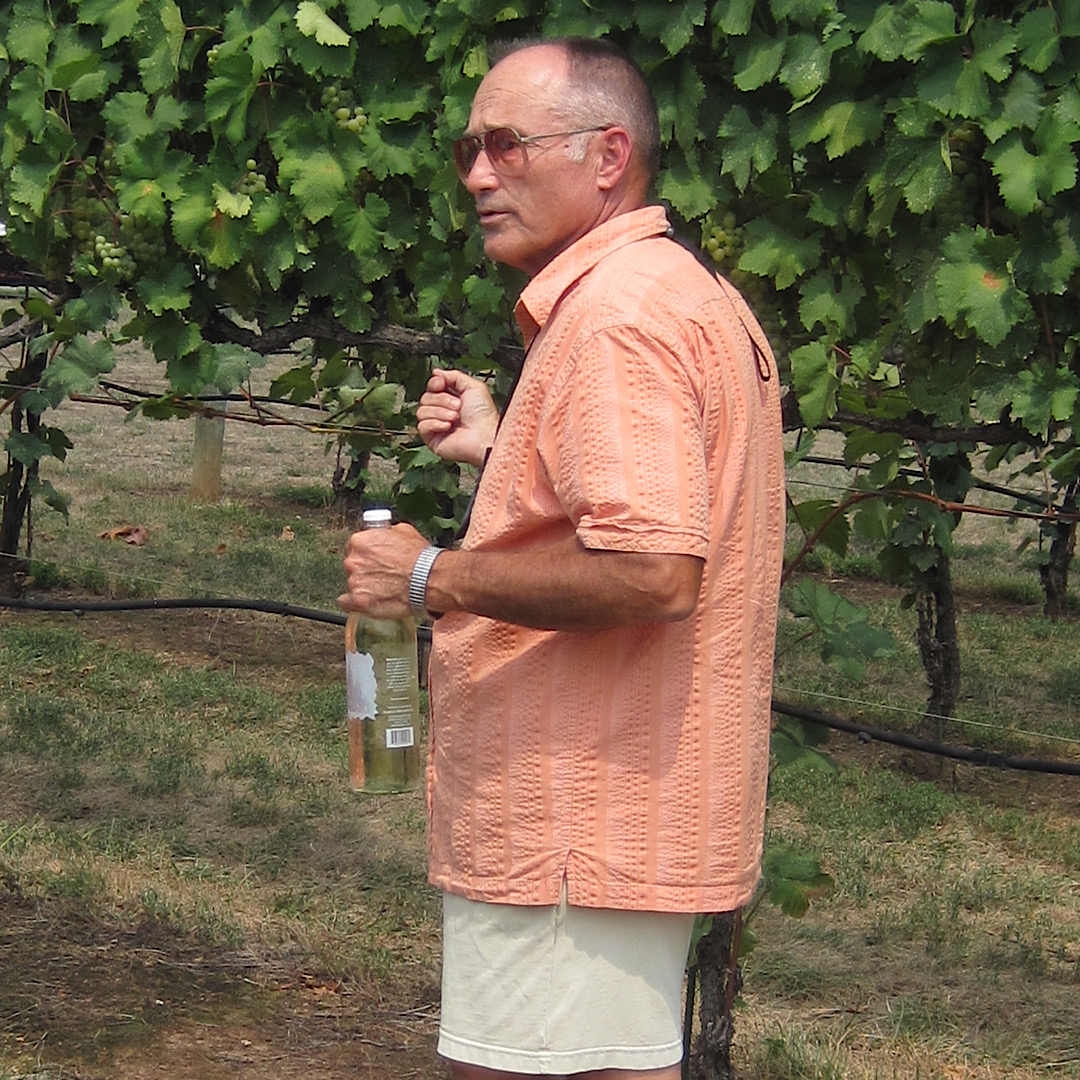
Those who have worked closely with Bill through the years echo similar sentiments. “Bill is a great guy!” “A damn good man!” “A man of intelligence and integrity.” “A positive man who worked hard and expected the same.” “Intelligent. Knowledgeable.”
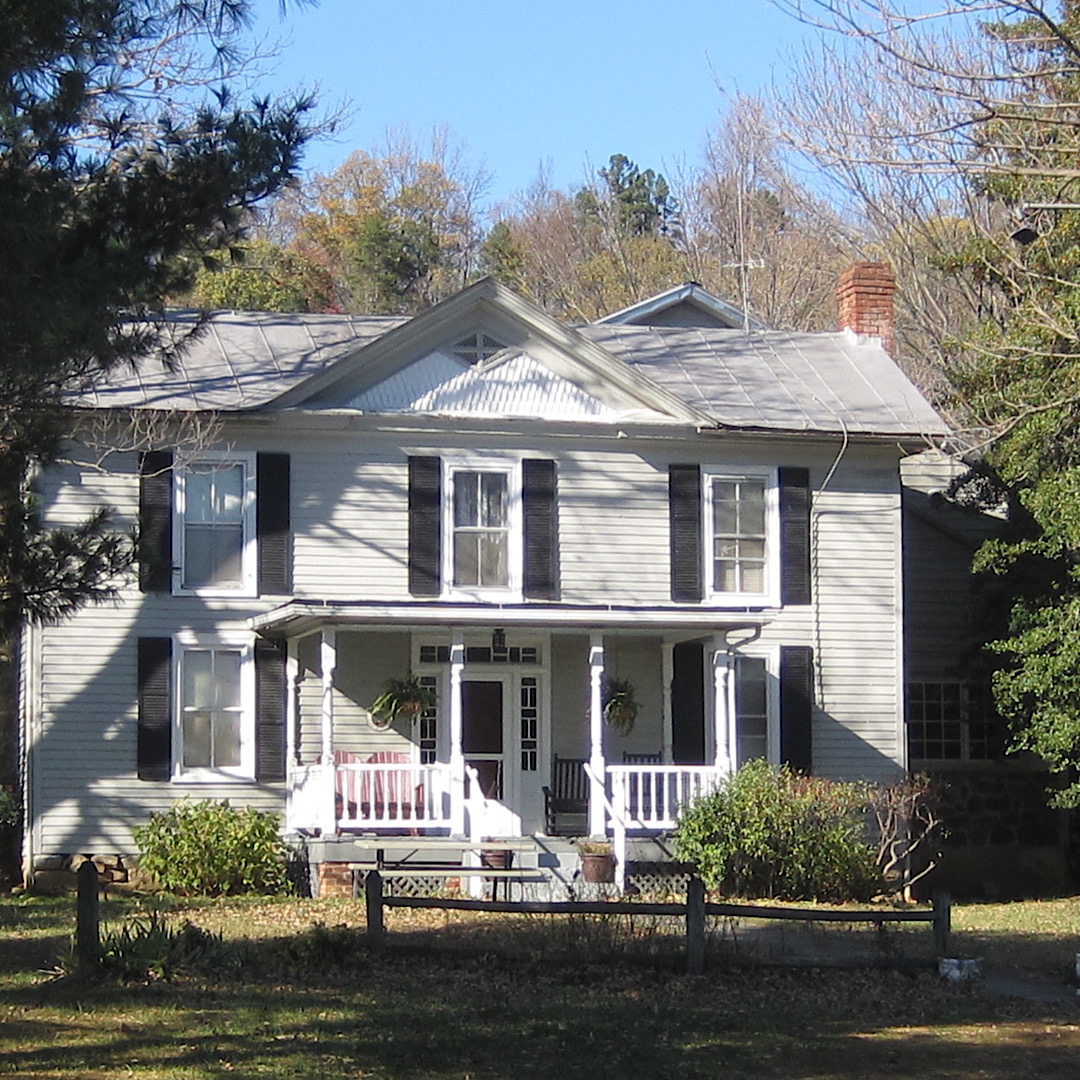
When it came to managing the farmhouse, Bill and Ann worked as a team. Ann kept the house clean, managed the rentals, and alerted Bill if any maintenance problems crept up. Whenever a maintenance problem did creep up, Bill fixed it. A great team who provided a great service to the community!
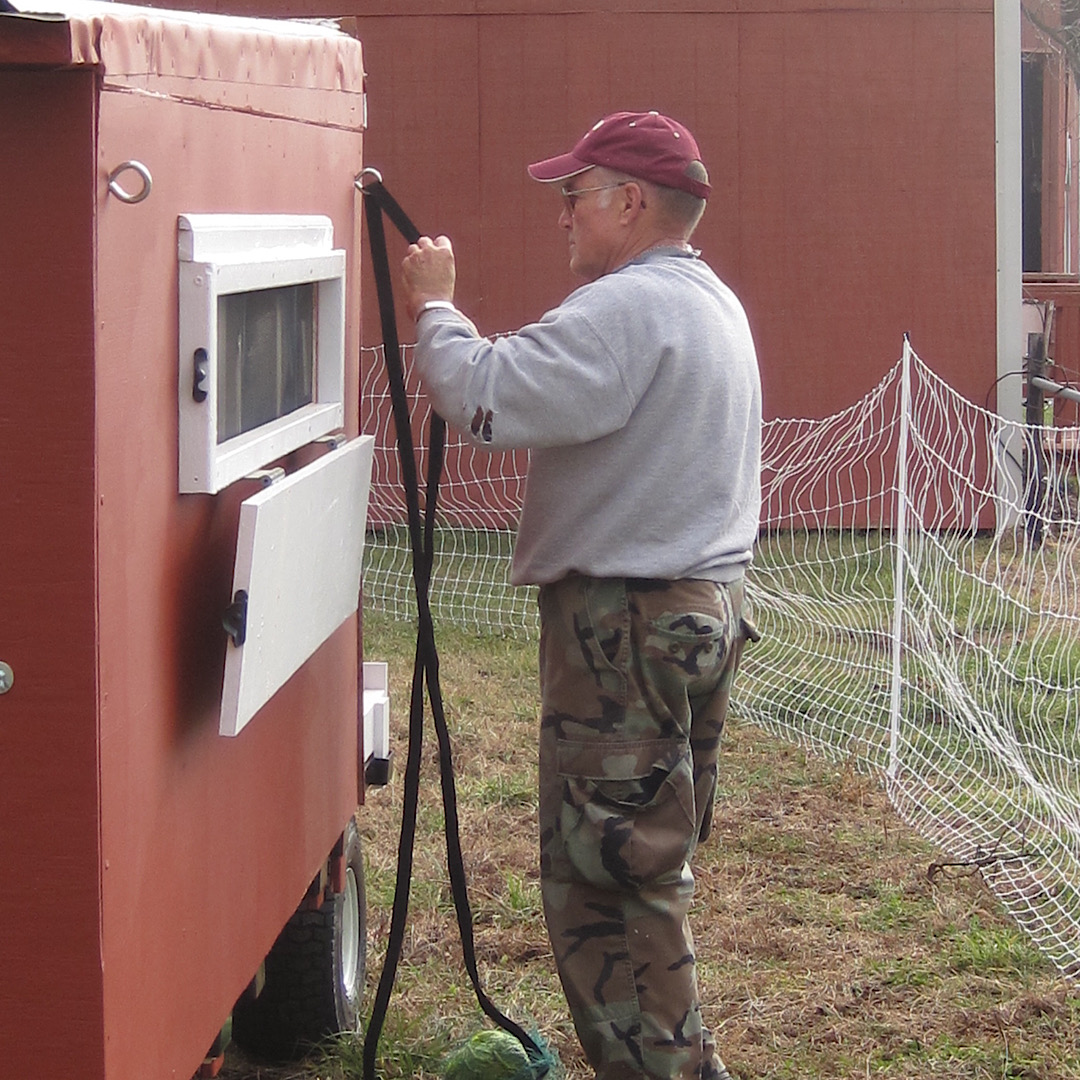
When the chicken committee disagreed on whether to cull older, less productive hens or care for them until their natural end, Bill built a mobile chicken coop for the older hens. Recently, the chicken mobile was refurbished to use in a new experiment with heritage breed chickens.
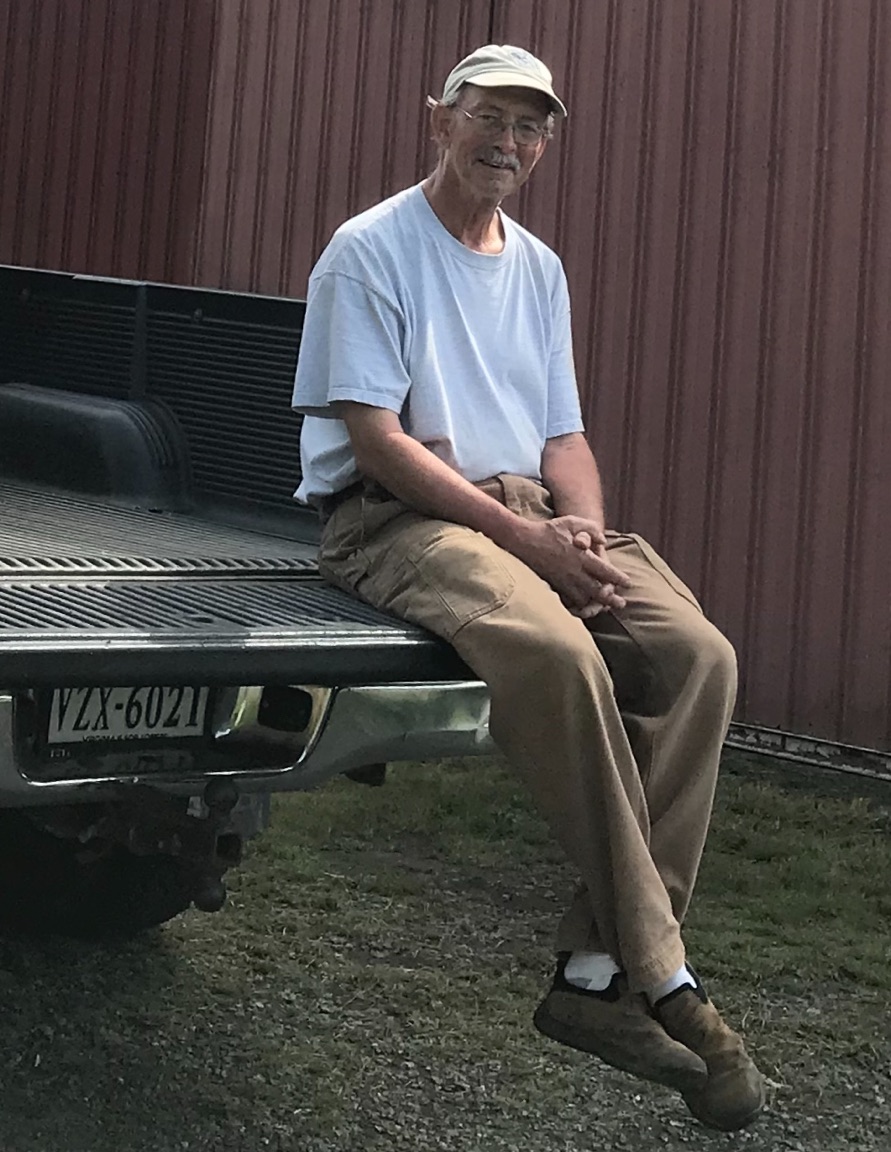
Mike Friedman, Bill’s best buddy and righthand man, would call Bill every morning at 8:30 to find out what they would be working on that day. It could be fencing, trimming, bush hogging, repairing buildings, tuning up a tractor, even removing a boulder, whatever needed to be done that day.
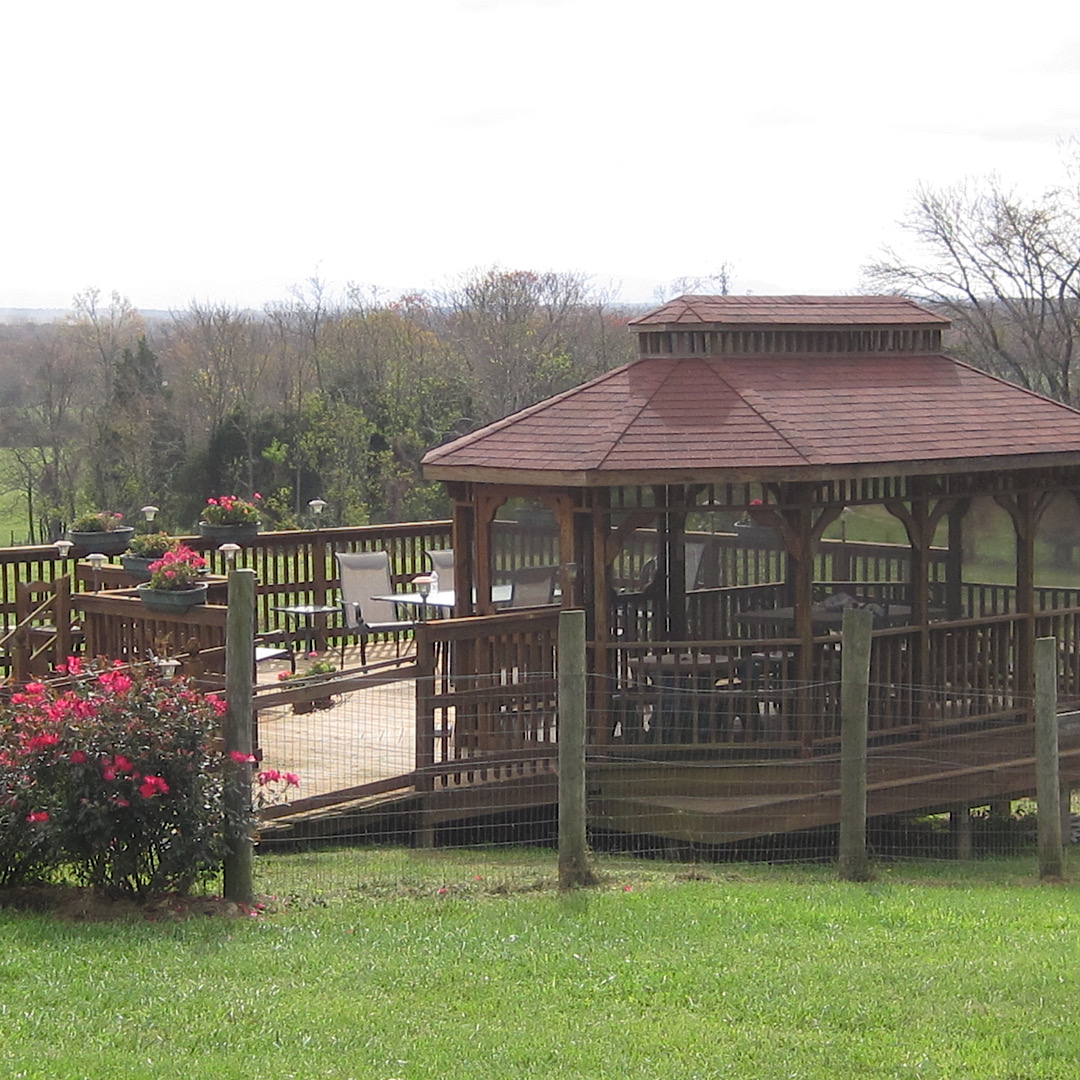
In 2007 Rose Arbogast donated a gazebo as a memorial to her husband Roger Arbogast, a US Navy veteran, musician and instrument maker. Bill Bohn and other volunteers installed the gazebo and built an attached deck by the orchard where Roger used to sit and play bluegrass music.
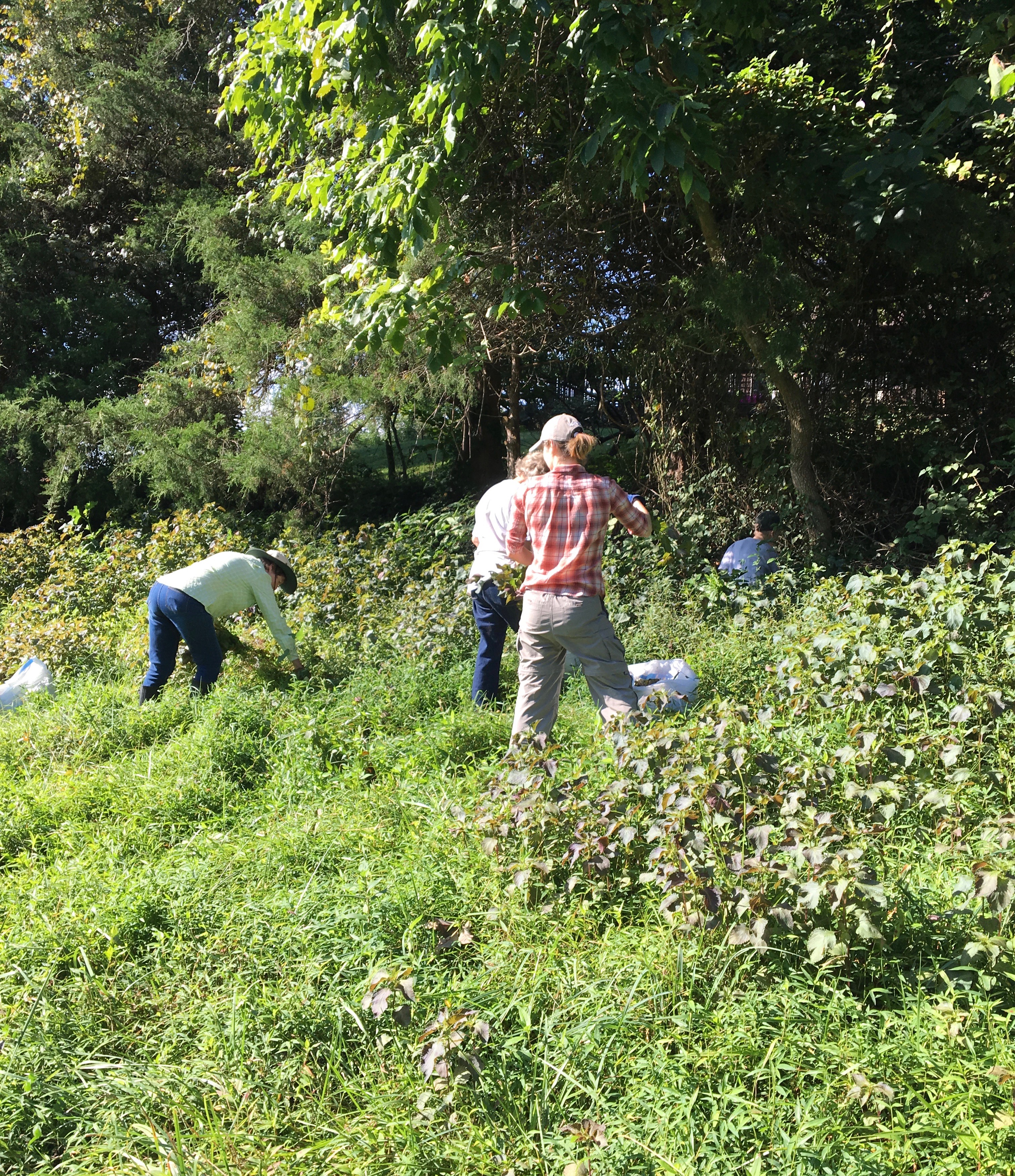
Bill knew how to rally the forces when extra help was needed. When he noticed the spread of the dreaded Perilla weed growing profusely along the road to the burn pile, he rallied the community into action with a Perilla Pulling Party that turned weed control into a fun event.
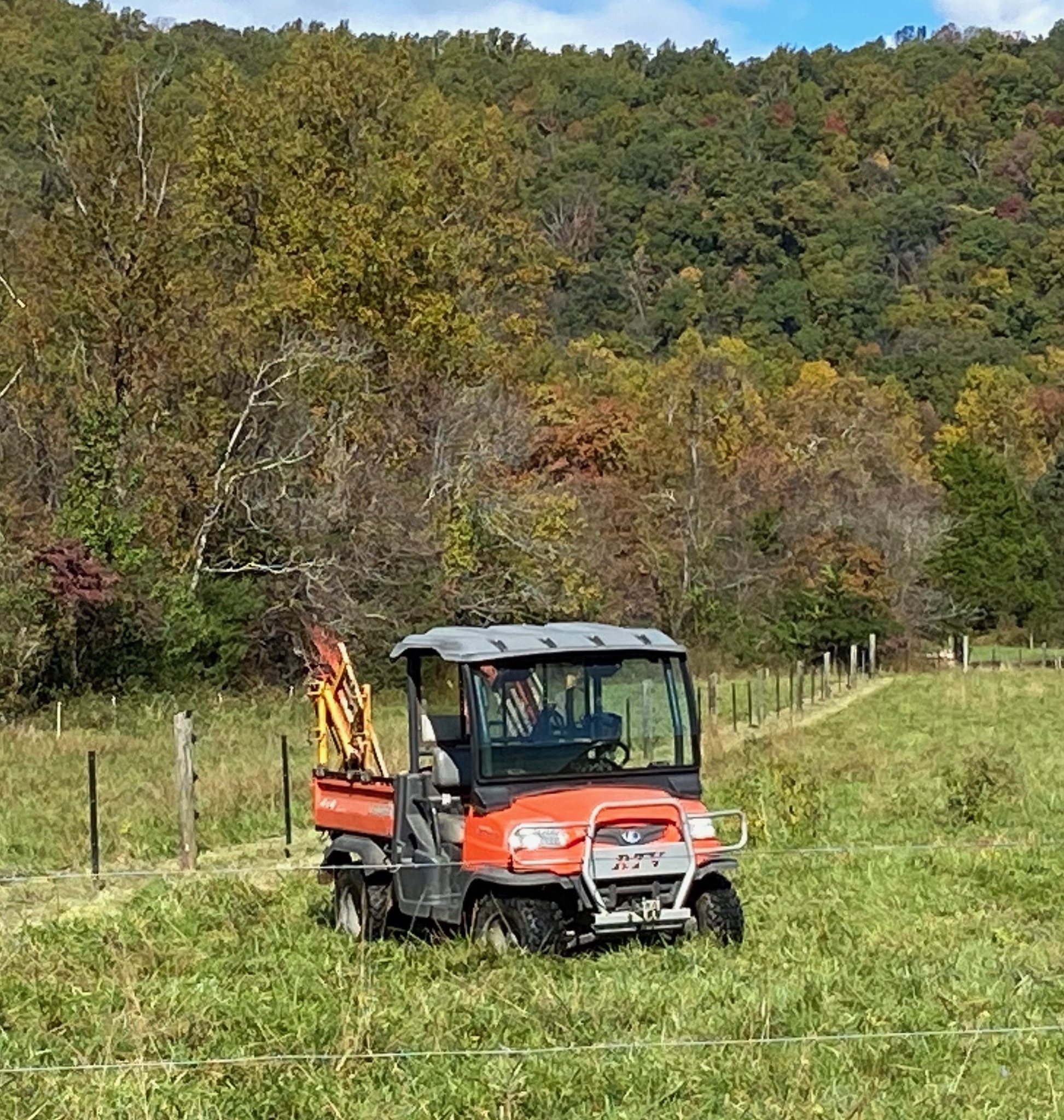
On any given day you could spot Bill Bohn’s Kabota somewhere on the farm. It was easy to spot. Bill’s Kabota is the orange one with every tool imaginable hanging from its side panels. Whenever you saw it, you knew something was getting done on the farm.
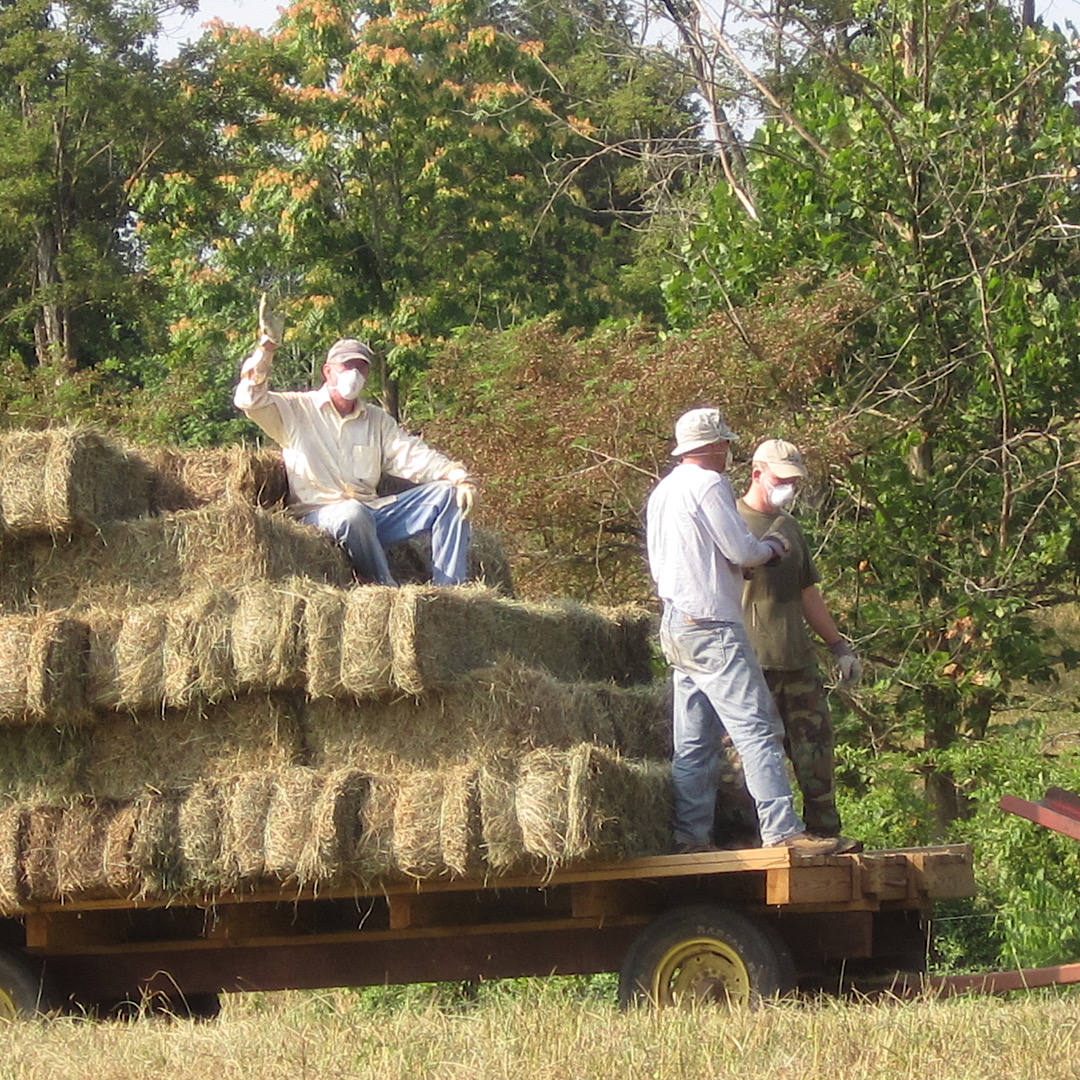
“Bill was the manager of the fields,” according to Dieter, “and (together) we determined when we can and should hay, and the fertilization and the fencing." Other members of the farm stepped in to help with the the bigger jobs. Pictured here, Bill, Ray Rush and Erich Nitzsche help with haying.
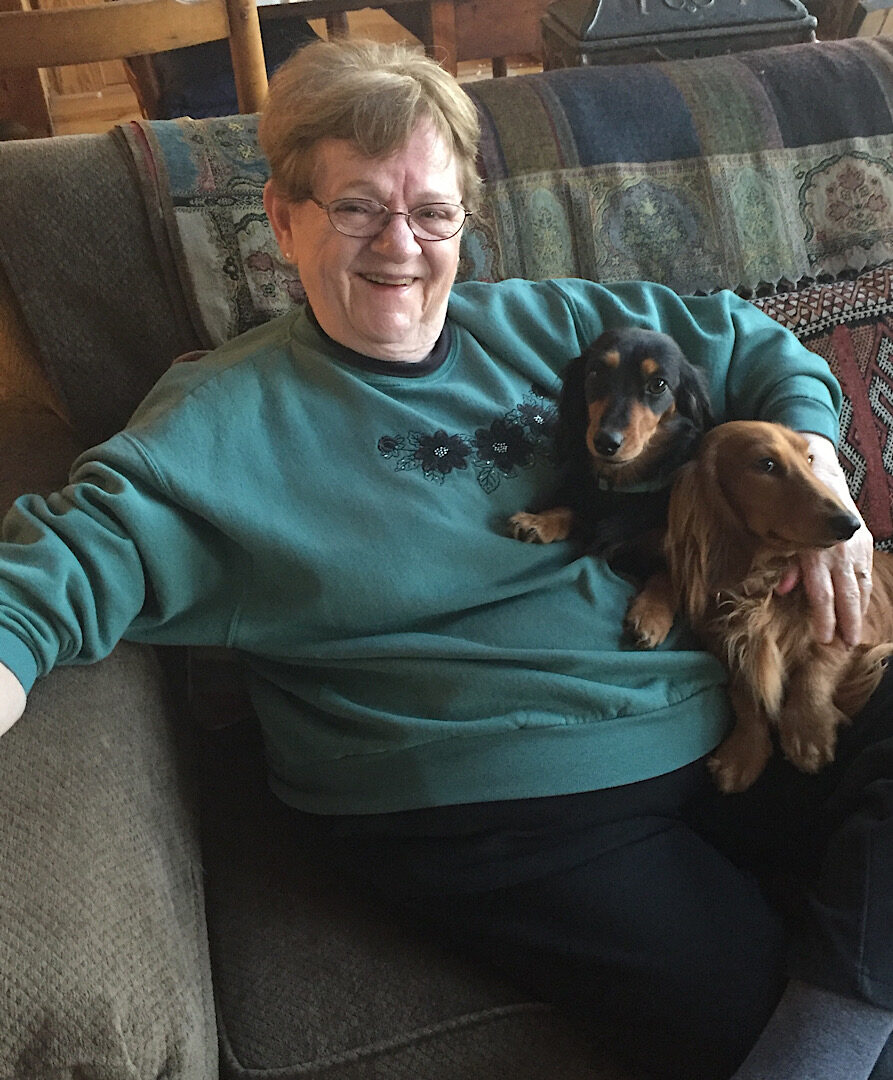
Ann kept a stable hand on the running of the farmhouse on behalf of our members. Her soups for lunch at the farmhouse on workdays are legendary. A future without Bill and Ann on the farm is inconceivable for many of us, but one we’ll have to get used to as Bill and Ann make the move from Farmcolony to Lynchburg.